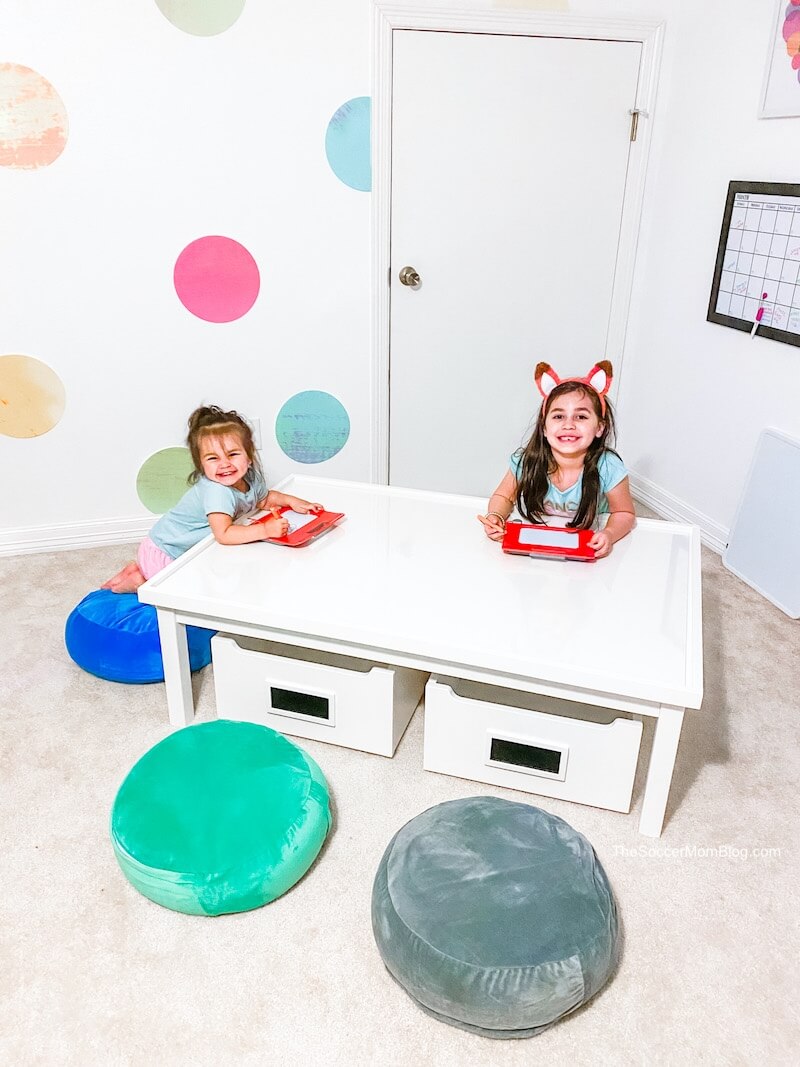What parents need to know about homeschooling in Texas: rules, curriculum requirements, and more — plus our favorite homeschool learning resources!
In 2020 and the first half of 2021, we participated in our school’s remote learning program. However, for the 2021-2022 school year, no remote learning was offered in Texas. For our family, we felt the safest option was to homeschool our daughter, who would be going into 2nd grade.
Since my husband and I both attended public school, we had no idea how to even get started homeschooling! Were there any rules? Any forms to fill out? Who did we need to tell?
I remember that when I was trying to find information about homeschooling in Texas, the information I did find was confusing. But it shouldn’t be! Homeschooling in Texas is surprisingly laid back, giving parents almost total freedom to teach how, what, and when they choose.
We are almost a year into our first official year homeschooling, and it has been the BEST decision we could have possibly made! Our daughter is learning and thriving and it has worked out perfectly for our family’s needs.
I thought it might be helpful for other new homeschool families to compile what I’ve learned about homeschooling in Texas, as well as the resources and curriculum we use.
I’ve done my best to compile the most accurate and complete information I can find, sourced from the US Department of Education and the Texas Education Agency. I also confirmed a few details with our local elementary school (where our daughter used to attend).
Keep in mind that there is no one-size-fits-all approach to homeschooling. What works for our family might not be the best option for another family. And that’s ok! With homeschooling you can try out different strategies, schedules, and curriculums and find what does work for you!
Here’s the latest information I’ve found about Texas homeschool rules…and after that I will share the learning resources our family uses and loves.
What are the Rules for Homeschooling in Texas?
Currently, Texas has no laws related to homeschooling, but the right to homeschool was established by a 1994 Texas Supreme Court ruling.
The US Department of Education website notes that “The state of Texas does not regulate, monitor, approve, register, or accredit programs available to parents who choose to homeschool their children.”
This gives parents a lot of freedom over how to homeschool their children!
What Subjects Must be Taught in a Texas Homeschool?
Even though there are no specific laws on the books in Texas about homeschooling, a 1994 Texas Supreme Court decision did address homeschool curriculum.
The final ruling in Leeper v. Arlington ISD cemented parents’ rights to homeschool in Texas. It also stated that a homeschool curriculum must be “bona fide,” meaning that you are teaching your children in “good faith” and not just pretending.
This ruling established 5 subjects that a homeschooler in Texas is expected to learn:
- Reading
- Spelling
- Grammar
- Mathematics
- Good Citizenship (This can include social studies, Texas history, etc.)
When it comes to curriculum, this can include:
- Books and workbooks
- Electronic curriculum (video or computer programs)
- Purchased curriculum developed by any source
- Public or private school curriculum
Our Favorite Homeschool Resources
Every child learns differently and part of homeschooling is figuring out what types of curriculum work best for your child. This can be a trial and error process…and that is ok!
I’ve included shop-able ad links to products that we love and use; read our full disclosure policy here.

Our “homeschool room” — which is in a corner of my office. Sometimes we also just work where we are, like the kitchen table. Whatever works!
Math
- Wonder Math — This is my daughter’s favorite part of the homeschool week! Not only does she learn new math skills, but she also gets professional tutoring and social interaction. Wonder Math is a weekly online live tutoring program designed to help 2nd – 5th graders build math skills and develop a love of learning. You can read our full review of Wonder Math here (plus ways that we make learning math fun!)
- Spectrum Math — These are the workbooks that we use to practice math equations during the rest of week. I like that the focus is on learning equations, versus “new math” that I didn’t learn as a kid. This way I am able to better help when my daughter has questions.
Writing, Grammar & Spelling
- Night Zookeeper — This is another online program that has been a big hit with my daughter. Night Zookeeper is an online creative writing platform that features spelling and word-building games, short writing challenges, and personalized activities. This is a self-paced program, but students have the opportunity to submit work for review by writing tutors. You can read our full review of Night Zookeeper here, plus find out how to get a free trial!
- Beginning Cursive Handwriting Workbook for Kids — Cursive writing is no longer taught in many schools, but we are teaching our daughter at home. This workbook is put together in a way that makes sense, learning letters that are written similarly first, then putting them together into words. It seems simple, but my daughter has picked up cursive really quickly with this book!
- Handwriting Practice Book (101 Jokes) — Handwriting can be kind of tedious, but my daughter loves this book because she gets to learn new jokes while practicing. Corny jokes are kind of a thing in our family!
- Scholastic Success with Grammar — This is a standards-based workbook, which I chose so if our daughter returns to public school, she will be at least at the expected grade level for her age. It features simple exercises to practice appropriate grammar skills.
- Journal — My daughter keeps a daily journal where she is free to write about any topic she chooses. Some days it is non-fiction about what she’s done so far that day. Other times she writes short stories. This is a great way to put into practice the grammar, handwriting, and spelling skills that she’s learned.
Reading
- Scholastic Success with Reading Comprehension — We do lots of silent reading and reading just for pleasure, but we also practice re-calling what we read. This is also helpful for understanding parts of a story, such as beginning, middle, and end.
- Silent Reading — During free time, my daughter enjoys reading on her tablet or books in our home library. Honestly the best way to improve at reading is simply to do it often!
Citizenship & Science
- For social studies, we have a 50 state workbook that has 2 pages of activities and puzzles for each state, going in alphabetical order. Kids learn trivia about each state, what each state is known for, capitals, etc. I don’t have a link for this because we found it in Target, but there are likely similar things in-store or on Amazon.
- DKFindOut! Science — This little books is packed with fun facts and STEM projects that kids can try. My daughter loves it!
- We are also members at the Houston Museum of Natural Science and visit about once a month. Most recently we checked out a fabulous exhibit about the treasures of the ancient pharaohs of Egypt. Our girls also love the fossil and dinosaur exhibits.
Extras
- The Magical Preschool Workbook — This is a book we got for our 3-year-old so she could do “school” with her big sister. It is primarily tracing activities: starting with lines and progressing to letters. She really enjoyed it! I’ve read mixed opinions on whether tracing is good for preschool age, but my daughter absolutely loved this book and finished it in a couple weeks.
- Not-So-Common-Cents: Super Duper Important Facts About Money You Can’t Afford To Miss — National Geographic Kids Books sent us a copy to check out and my daughter LOVES it! She will pick up this book and go read it on her own, without me even asking. She told me it has a lot of interesting facts…”cool” in her own words. When an 8 year old tells you an educational book is cool, you know it’s a winner! I like this book because it details how money came to be, what is credit, etc. in a way that kids can understand.
As you can see, our curriculum is a mix of different types of workbooks, online resources, and hands-on activities. We have certain things that we do daily (1-2 pages in each of our core workbooks), some things we do weekly (Wonderland Math), and the rest of our time is flexible.
There are also homeschool curriculums that you can purchase that cover all subjects, if you want an all-in-one package. That’s just not the route our family went, as we instead decided to hand pick resources for each subject.
That is what I love about homeschooling — every family can do what works best for them.
Homeschooling has also made my daughter more self-motivated (she can get started on her workbooks without our help) and has even got her excited about school. She especially loves her weekly Wonderland Math sessions, creating new zoo animals in the Night Zookeeper, and our museum visits.

We practice traditional pencil and paper writing skills, but we also utilize online tools such as Night Zookeeper.
Frequently Asked Questions
Does Homeschooling Cost Money?
Technically no, homeschooling in Texas does not cost money. There are no fees to pay.
That being said, you may choose to purchase curriculum for your student. You may also want to take field trips to museums, etc.
There are also online programs that may be helpful for social interaction or teaching specific subjects, such as math. I will share some of our favorites later in this post!
Homeschooling can be as cheap or as expensive as you want it to be! But in all seriousness, you can keep costs pretty low. Homeschooling for us is MUCH less pricey than a private school would be.
How Many Hours Must I Teach My Homeschooler?
There are currently no minimum required hours for homeschooling in Texas.
Some days we spend more time on school than others. My main concern is simply that we get our work done. If it takes my daughter an hour to finish her work, that’s ok! If we have extra activities, like a museum visit, our school day might be longer than usual.
Who Do I Need to Inform?
If your child has never attended school, you do not need to inform anyone of your intent to homeschool. There are no forms to fill out, no applications, etc.
If you child has already attended public school and you want to switch to homeschooling, then you will want to contact your school administrator. You may need to withdraw your child from the school so they won’t think you are skipping and send the truancy board after you.
Other than that, all you need to do is get started!
What Subjects are Required?
- Reading
- Spelling
- Grammar
- Mathematics
- Good Citizenship (This can include social studies, Texas history, etc.)
Do Homeschoolers Have to Take the STAAR Test in Texas?
The STAAR test is the standardized test given to students in Texas public schools. Homeschoolers do not need to take the STAAR test.
What Happens if I Decide to Enroll my Homeschooler in Public School?
Circumstances change, so in the possibility that you need to enroll your child in a Texas public school it is helpful to know in advance what to expect.
When it comes to grade placement, the Texas Education Agency (TEA) has this to say about how they evaluate and place homeschoolers:
Awarding of credit for courses taken may be determined by reviewing the curriculum and/or work of the student, or by using appropriate assessments.
This is also why it is important to make sure that you include the required curriculum in your daily lesson plans.
Do Texas Homeschoolers Need to get a GED?
No, a General Educational Development test (GED) is not required to prove that a homeschooler graduated.
The Texas Education Code states that “the State of Texas considers successful completion of a nontraditional secondary education to be equivalent to graduation from a public high school,” — and “nontraditional secondary education” includes home school.
This code also clarifies that colleges and universities may not require homeschoolers to submit a GED or public high school diploma. Homeschool graduates must be treated equally to graduates of public high schools. Homeschoolers may be required to take standardized tests (i.e. the SAT or ACT), but only if this is also required of public high school graduates.
Fortunately, this is not something that my own family has to worry about for a while, but I did want to at least touch on the topic of graduation. Hopefully this takes some of the stress away from your homeschool decision, knowing that your child can still attend college if that is their plan!
If you’re getting closer to college age, I would suggest getting in touch with the admissions office of any institution you’re considering, and find out their specific requirements.
Note: Please keep in mind that this information is current to the best of my knowledge, at the time I wrote this post. If you have additional questions, you may want to contact your local education agency or check the Department of Education’s website, specifically the Texas section.
One More Thing
And this might be the most important…
There is no such thing as the “right” way to homeschool!
While there are certain guidelines in each state, homeschooling does allow parents a large degree of flexibility to do what is best for their own family.
It allows you to teach things that you want to teach, and eliminates a lot of wasted time. That is honestly one of the things my daughter loves most…she can be much more efficient in homeschool instead of “sitting in a desk” for 8 hours…as she describes it.
There may be a point where we go back to public schooling. And in fact, our oldest daughter does attend public school.
But for now, we are loving the homeschool experience!
I hope you found this information helpful! Feel free to share your own tips in the comments too!
You might also like:
What is Online Public School and is it Right for My Child? This could be a good option if you’re looking to do school at home or a hybrid experience.
20+ Learning at Home Activities
- Paper Chain Octopus Craft - April 24, 2024
- Amish Sugar Cookies - April 19, 2024
- Marshmallow Playdough - April 18, 2024





Maritza says
Hi Stacy,
I have a question my children have never attended public school. Do I have to be a member of the Texas homeschool coalition and pay the fees to be a member.
Stacey aka the Soccer Mom says
No, membership is not required. That is a private group that sells homeschool information. I believe they also lobby the state government based on their values.
Stefanie says
I live in California, but I am considering moving to Texas. I have homeschooled my kids here for six years and we belong to a charter school who gives us funds for anything for school. They give us around $2,600 per kid, per year. Is there similar charter school programs there?
Stacey aka the Soccer Mom says
I don’t believe so. Charter schools in Texas are public schools that you have to apply to, but they are no cost, just like public schools. I’m not aware of any funds given to homeschool families, but that would be nice!
Sameer says
Do we need to register (or, something similar) with Texas Education Agency (or, another body) to inform them that we are homeschooling? Or, do we simply get started?
Stacey aka the Soccer Mom says
You should be able to get started — there is no registry. If your child was previously enrolled in another school, you will want to contact them and let them know you’re homeschooling now.